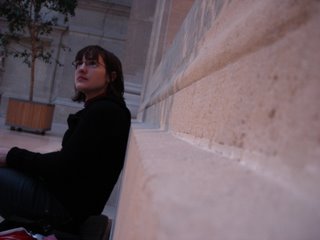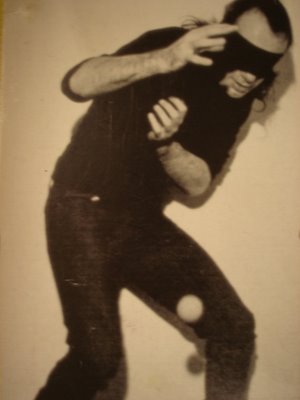Paris is Paris
I suppose I should introduce this blog in some way to give it relevance to a film course and not just to me and my life. It began way back in week three with the discussion in my tutorial group about Mekas (whose film i actually missed) and why we choose to specifically write down certain events and thoughts for later contemplation and how the meanings can change as our perspective changes as it must because time does not stand still. It made me think not of my diary but of this particular diary entry because I remember thinking I must capture this moment which is not that interesting really. All I am doing is sitting in a cafe`, drinking wine and smoking cigarettes. I returned again to this memory of writing a diary entry when we talked about Varda, in part because Cleo 5 a 7 was set in Paris but also because of her approach to documentary film making in 'The Gleaners and I'. The Gleaners documents a part of social history, her interviews are not confessions, they are stories with self contained emotion and no need for dramatisation.
...The gay guys opposite me gave me a strange strange look when I came in but I think they got over the shock. I am quite shocking looking at the moment; no shower for two days, no washing of hair for 3-4. So lets recount todays activities. First stop the Louvre. Simple right. All going well. Alarm rings at 8.30 to get me up so I can go visit Jim. Two hours later I awoke to the sight of a guy in my room. This hostel must be unisex I think but he has some very strange luggage. I half freak out, half don't care. The realisation is made sometime later that there are in fact two people in my room. A man and woman, maybe I am being robbed? I still do not care and pretend rather badly to be asleep despite obvious signs such as sitting up, rolling over and opening eyes. The sleep invaders have an enormous amount of luggage which puts my poorly packed, poorly treated backpack to shame... My room mate is pregnant and french and I assume somehow associated with the man who was not sleeping in the room and that they shared the mountain of luggage which was kept in my room because the man may or may not have been sharing a room with some unsavoury types. My visit to Jim was deferred for the day as was my friend Todd-which was deferred due to my bad experiences in general with males in the past week. Honestly haven't been groped so much in my life, the bad kind of groping. Can you tell I'm drinking red wine now? So I'm on my way to the Louvre, have not lost metro ticket nor mind nor self. Arrive at Louvre train stop, follow signs, buy ticket and ask information lady if I have to check my bag. 'oui'. Arrive at cloak room and the guy has to comment on the fact that I have a woman's bag. Being conversationally deprived I of course have to comment on this and a conversation begins and I get asked out, sorry boyfriend, and people are singing James Brown and I lose my ticket somehow. So I had to be escorted past security by the guy from the luggage check who was telling me he'd never seen anything like this before. When I got inside I found my ticket saw the venus de milo, saw the mona lisa and saw people with back packs bigger than mine. Got back to luggage check, same guys, conversation included killing me for finding my ticket, smoking hash and marriage. Ok still in gay bar- on to second glass of wine (cigarette?) Worried about the metro because i don't know where i am.....
References:
Alison Smith, 'Agnes Varda'. Manchester University Press: Manchester, 1998, 61.

...The gay guys opposite me gave me a strange strange look when I came in but I think they got over the shock. I am quite shocking looking at the moment; no shower for two days, no washing of hair for 3-4. So lets recount todays activities. First stop the Louvre. Simple right. All going well. Alarm rings at 8.30 to get me up so I can go visit Jim. Two hours later I awoke to the sight of a guy in my room. This hostel must be unisex I think but he has some very strange luggage. I half freak out, half don't care. The realisation is made sometime later that there are in fact two people in my room. A man and woman, maybe I am being robbed? I still do not care and pretend rather badly to be asleep despite obvious signs such as sitting up, rolling over and opening eyes. The sleep invaders have an enormous amount of luggage which puts my poorly packed, poorly treated backpack to shame... My room mate is pregnant and french and I assume somehow associated with the man who was not sleeping in the room and that they shared the mountain of luggage which was kept in my room because the man may or may not have been sharing a room with some unsavoury types. My visit to Jim was deferred for the day as was my friend Todd-which was deferred due to my bad experiences in general with males in the past week. Honestly haven't been groped so much in my life, the bad kind of groping. Can you tell I'm drinking red wine now? So I'm on my way to the Louvre, have not lost metro ticket nor mind nor self. Arrive at Louvre train stop, follow signs, buy ticket and ask information lady if I have to check my bag. 'oui'. Arrive at cloak room and the guy has to comment on the fact that I have a woman's bag. Being conversationally deprived I of course have to comment on this and a conversation begins and I get asked out, sorry boyfriend, and people are singing James Brown and I lose my ticket somehow. So I had to be escorted past security by the guy from the luggage check who was telling me he'd never seen anything like this before. When I got inside I found my ticket saw the venus de milo, saw the mona lisa and saw people with back packs bigger than mine. Got back to luggage check, same guys, conversation included killing me for finding my ticket, smoking hash and marriage. Ok still in gay bar- on to second glass of wine (cigarette?) Worried about the metro because i don't know where i am.....
"What did Paris evoke for me? A vague fear of the big city and its dangers, of getting lost in it alone and misunderstood, or even brushed aside."
-Agnes Varda
-Agnes Varda
References:
Alison Smith, 'Agnes Varda'. Manchester University Press: Manchester, 1998, 61.





